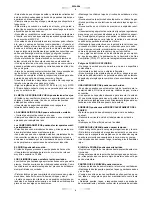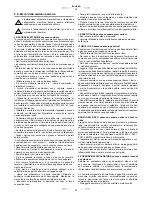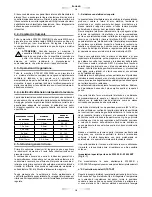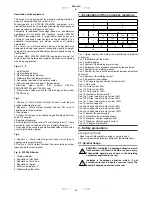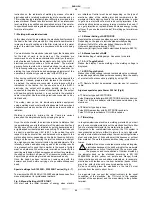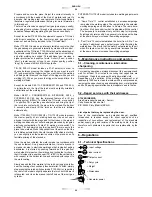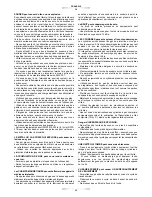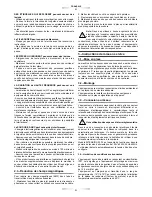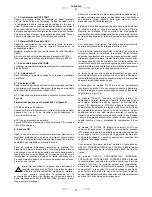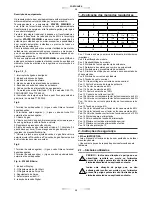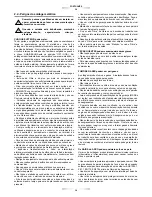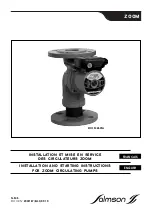
ENGLISH
21
21
Description of the equipment
This product is an equipment for manually welding metals by
means of heat produced by an electric arc.
Technologically, the STAYER WELDING equipment is an
electrical power source for welding by transferring high frequency
power managed by intelligent control logic.
Compared to traditional technology based on transformers
operating at 50 Hz public grid frequency, Inverter STAYER
WELDING technology has a larger power density per unit
of weight, increased power saving and the possibility of an
automatic, instantaneous and precise control of all welding
parameters.
As a result, you will more easily produce a better weld with
equipments having lower power consumption and less weight
compared to equivalent traditional equipments based on heavy
transformers.
All series MMA STAYER WELDING equipments are apt for
coated electrode welding and tungsten electrode torch welding
with inert gas protection.
Figs: 1, 2, 3.
1. On/off switch
2. Light emitting indicator
3. Light emitting alarm indicator
4. Welding intensity adjustment control
5. Connection terminals of the welding cables
6. Power supply cable and plug of the equipment
7.Electrode mode switch /TIG (models S60.17L,
PROGRESS1700L and T100.20H only)
8. Preflow and postflow switch for the inert gas outlet (model
T100.20H only).
Fig 4.
1 Positive (+) Weld Output Terminal Connect work lead to
positive weldoutput terminal.
2 Negative (- ) Weld Output Terminal Connect TIG torch to
negative weld output terminal.
3 Gas Cylinder
4 Cylinder Valve Open valve slightly so gas flowblows dirt from
valve. Close valve.
5 Regulator/Flowmeter
6 Flow AdjustTypical flow rate is (15 cubic feet perhour) 7.1 liters
per minute. Connect torch gas hose to regulator/flowmeter.
7 Gas Valve Valve controls gas preflow andpostflow. Open valve
on torch just before welding.
Fig 5.
1 Negative (- ) Weld Output Terminal Connect work lead to
negative weld output terminal.
2 Positive (+) Weld Output Terminal Connect electrode holder
topositive weld output terminal.
Fig. 6 - S100.25B Series:
1. Display indicator.
2. Regulation of Hot Start.
3. Regulation of Arc Force.
4. Regulation of Amps.
5. Selector to display A / V.
6. Digital voltage reduction.
1.- Explanation of the normative markings
1
2
3
4
5
6
8
10
11
11a
11b
11c
7
9
12
12a
12b
12c
13
13a
13b
13c
14
15
16
17
18
Pos. 1 Name, address and mark of the manufacturer, distributor
or importer.
Pos. 2 Identification of the model
Pos. 3 Model mapping
Pos. 4 Symbol of the welding power source
Pos. 5 Reference to the standard complied by the equipment
Pos. 6 Symbol for the welding process
Pos. 7 Symbol for use in environments with increased electrical
shock risk
Pos. 8 Symbol of the welding current
Pos. 9 Nominal no-load voltage
Pos. 10 Voltage range and nominal output current
Pos. 11 Duty cycle
Pos. 11a Duty cycle at 45%
Pos. 11b Duty cycle at 60%
Pos. 11c Duty cycle at 100%
Pos. 12 Nominal cutoff current (I2)
Pos. 12a Current value for duty cycle at 45%
Pos. 12b Current value for duty cycle at 60%
Pos. 12c Current value for duty cycle at 100%
Pos. 13 Load voltage (U2)
Pos. 13a Voltage value for duty cycle at 45%
Pos. 13b Voltage value for duty cycle at 60%
Pos. 13c Voltage value for duty cycle at 100%
Pos. 14 Symbol for power supply
Pos. 15 Nominal value of voltage supply
Pos. 16 Maximum nominal supply current
Pos. 17 Maximum effective supply current
Pos. 18 IP degree of protection
2.- Safety precautions
READ INSTRUCTIONS.
• Read Owner’s Manual before using or servic-ing unit.
• Use only genuine replacement parts from themanufacturer.
2.1.Symbol Usage
DANGER! - Indicates a hazardous situation which,
ifnot avoided, will result in death or serious injury.
Thepossible hazards are shown in the adjoining
symbolsor explained in the text.
Indicates a hazardous situation which, if not
avoided,could result in death or serious injury. The
possible hazards ex-plained in the text.
Содержание BITENSION 20/14
Страница 3: ...3 3 fig 9 POTENZA TIG 170 HF 3 12 11 10 5 8 5 1 7 2 6 ...
Страница 52: ...POLSKI 52 52 ...



